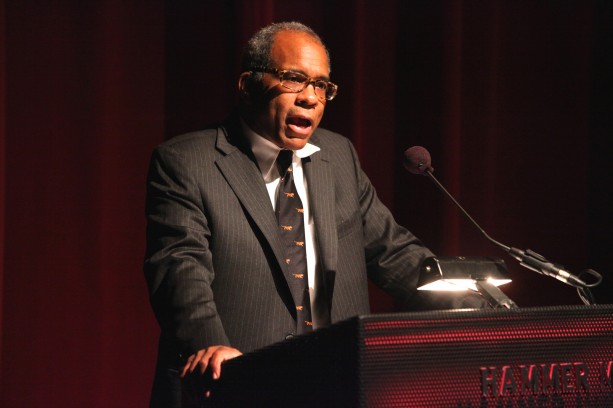
Randall Kennedy, Harvard professor of law and author of The Persistence of the Color Line: Racial Politics and the Obama Presidency, had an assignment: to answer whether or not Obama has been erasing the color line. “By color line,” explained Kennedy, “I mean all of the sentiments, instincts, habits of mind, structures that wrongly stymie people because of race. Is Obama erasing that baleful aspect of political culture?”
In a word, said Kennedy, yes. But there was a caveat: the “Obama way” is to avoiding talking about race at every turn.
 According to Kennedy, Obama’s most impressive feat was to treat making it to the White House as a realistic, tenable option. His legacy, Kennedy believes, will be the alteration of public psychology to a place of normalizing a black presidency. After four years, people will have accepted seeing a black man enter and exit Air Force One.
According to Kennedy, Obama’s most impressive feat was to treat making it to the White House as a realistic, tenable option. His legacy, Kennedy believes, will be the alteration of public psychology to a place of normalizing a black presidency. After four years, people will have accepted seeing a black man enter and exit Air Force One.
“It was so audacious because of the history of the U.S.,” he said.
As Kennedy reminded the audience, a crowd of a few hundred gathered in an auditorium in the Hammer Museum, African-Americans were largely excluded from politics until the Voting Rights Act of 1965. “Blacks were excluded by dint of terror throughout the deep South, excluded by dint of various legal shenanigans,” Kennedy said.
Although African-Americans like Shirley Chisholm and Jesse Jackson ran for high office before Obama ever did, it was more of a symbolic gesture. “They weren’t running on any hopes of prevailing,” Kennedy observed. Obama’s victory changed all of that.
Still, although Obama was helped, in certain ways, by his race in the 2008 election, his “blackness” was still something to be overcome, Kennedy contended. As poll numbers revealed, a significant number of Americans–millions, in fact–still expressed discomfort over the idea of nominating a black person, even if he was from their own party, and even if he was capable.
“Then there were those who voted for Obama despite his race,” Kennedy said. Some of these people, when questioned, responded: “I’m voting for the nigger.”
On the positive side, racism has become stigmatized in America over the last 50 years. “No serious electoral politician would say they wouldn’t vote for a black person,” Kennedy said. “Of course, we don’t always say what we’re thinking.”
 Much of Kennedy’s analysis centered around the nuances of race: the things that go unspoken. He contended that racism now gets conveyed between the lines, such as with birtherism and Donald Trump. “A substantial part of birtherism was sublimated racism,” said Kennedy. “People couldn’t say ‘we don’t like him because he’s black.’”
Much of Kennedy’s analysis centered around the nuances of race: the things that go unspoken. He contended that racism now gets conveyed between the lines, such as with birtherism and Donald Trump. “A substantial part of birtherism was sublimated racism,” said Kennedy. “People couldn’t say ‘we don’t like him because he’s black.’”
Representative Joe Wilson from Kennedy’s home state of South Carolina offered another example of this sort of thing when he shouted “You Lie!” to the President. “Would he have felt so emboldened with a different sort of president before him?” Kennedy questioned.
For his part, Obama only talks about race when he has to. Even in his already anthologized “More Perfect Union” speech surrounding Jeremiah Wright, Obama was measured. “Barack Obama is a good writer,” Kennedy said. “The ‘More Perfect Union’ speech was full of the passive voice in certain instances…Black people were enslaved. They suffered under slavery.”
Still, to the naysayers and critics, Kennedy had an exhortation: “You can push Obama, but for goodness sakes, don’t push him down.”
Kennedy’s own criticisms of Obama only came up in the question-and-answer portion of the evening. Kennedy said he believes that Obama didn’t actively do enough to change the ideological landscape of the country and that he was sheepish about outwardly supporting liberal judges. Kennedy was most critical of Obama’s stances surrounding gay rights, finding it ironic that when Obama’s parents married across racial boundaries it was considered a felony in many places. Now Obama is pushing a “separate but equal” equivalent in the gay community.
 When asked if Obama keeps mum on the issue of race simply because we may be living in a post-racial society, Kennedy wasn’t sanguine. “I think that he’s essentially adapting himself to a political environment that is still very substantially deformed by a racial predicament,” answered Kennedy. “And one of the aspects of that deformation is deep-seated denial.”
When asked if Obama keeps mum on the issue of race simply because we may be living in a post-racial society, Kennedy wasn’t sanguine. “I think that he’s essentially adapting himself to a political environment that is still very substantially deformed by a racial predicament,” answered Kennedy. “And one of the aspects of that deformation is deep-seated denial.”
Still, all in all, said Kennedy, Obama had to do a lot of color line finessing in order to ascend the political ladder. Certainly, he had to downplay the problems historically faced by African-Americans. He also had to soft-pedal any white culpability in such matters. Nevertheless, Obama won. That alone constituted a major step toward erasing the color line. And the work continues.
For full video, click here.
See more photos here.
Read an excerpt from The Persistence of the Color Line here.
Buy the book: Skylight Books, Powell’s, Amazon
Read five expert opinions on the importance of Obama’s race here.
*Photos by Aaron Salcido.




Send A Letter To the Editors